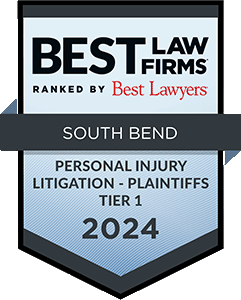 After an accident, many victims experience prolonged physical and mental effects due to their injury. Although a personal injury claim will compensate you for your medical expenses and lost wages, you can only obtain compensation for pain and suffering by filing a lawsuit against the at-fault party.
After an accident, many victims experience prolonged physical and mental effects due to their injury. Although a personal injury claim will compensate you for your medical expenses and lost wages, you can only obtain compensation for pain and suffering by filing a lawsuit against the at-fault party.
To find out if you may be entitled to compensation for pain and suffering, schedule a free, no obligation consultation with Pfeifer, Morgan & Stesiak’s personal injury lawyers in South Bend. We will review your claim to help you determine if you can file a personal injury lawsuit to pursue additional damages against the at-fault party.
Below, we provide several examples of pain and suffering and how we may determine the amount of compensation you can receive.
Examples of Pain and Suffering
In a personal injury lawsuit, pain and suffering is typically defined as the adverse physical discomfort and mental anguish you have endured since being injured in the accident, such as:
- Mental anguish
- Emotional distress
- Fear
- Insomnia
- Anger
- Anxiety
- Shock
- Humiliation
- Loss of enjoyment of life
- Depression
- Generalized anxiety disorder
- Post-traumatic stress disorder
How Pain and Suffering Can Be Calculated
There is no set way to calculate damages for pain and suffering. All cases have differing factors that must be considered.
When calculating damages for pain and suffering, insurance companies or the court consider the following factors:
- The severity of your injury
- The pain and discomfort associated with your injury
- The injury’s impact on your job, life, relationships and other elements
- How much medical care was required to treat the injury and what types of care
- The amount of time it takes this type of injury to heal
- Future medical care required to treat the injury
Although our lawyers will look for common factors to determine if you may be entitled to compensation for pain and suffering, no two personal injury lawsuits are the same. We will take careful consideration for each claim we review to accurately determine the amount of compensation you may be entitled to receive.
How to Document Pain and Suffering
Because pain and suffering is intangible and cannot be proved by using physical evidence, you will need to carefully document your physical discomfort or mental distress.
However, there are several types of documents that our attorneys may use to prove you have experienced prolonged pain and suffering after the accident. This includes:
- Medical records
- Medical bills
- Receipts for out-of-pocket medical expenses
- Documentation of lost wages and time off work
- Photos of your injuries
- A personal diary logging all treatment, pain, emotions and missed activities you have experienced since the accident
To prove your pain and suffering, we also recommend you take the following steps:
- Fully report your pain and mental health symptoms to your physician so they will be documented in your medical records.
- Make necessary doctors’ appointments to diagnose and treat ongoing pain and suffering you are experiencing.
- Keep a daily journal where you note the symptoms you are experiencing due to your injury, pain levels, and how your injury may be preventing you from performing simple tasks.
Contact Pfeifer, Morgan & Stesiak to Learn More
To find out more about the compensation you may be entitled to pursue after an accident, contact Pfeifer, Morgan & Stesiak to schedule a free, no obligation consultation.
Our trusted personal injury lawyers will carefully review your claim to determine if you have a case against the at-fault party responsible for causing your injury. We only work on a contingency fee basis, which means you only have to pay us if we recover compensation for your claim. There is no risk in contacting us to find out if you have a case.
Call (844) 678-1800 and speak to a lawyer today.











